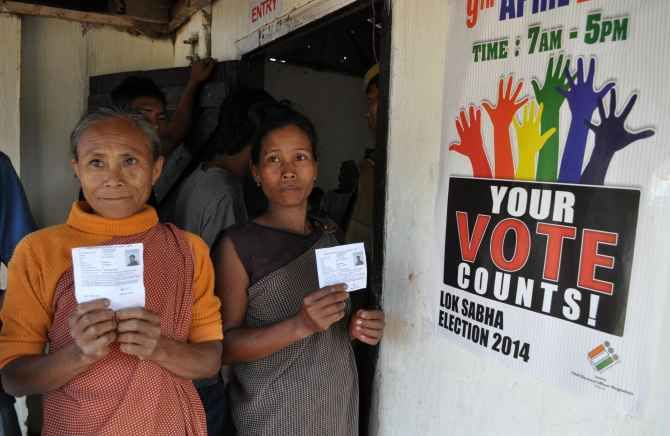
'Elections don't offer easy or ideal choices. Voters may find there is no candidate whom they can fully trust. But here is a litmus test for choosing between competing imperfection: Reject any candidate or party that asks you to put growth above secularism,' says Rajni Bakshi.
In the final lap, the Lok Sabha election campaign many contenders and political commentators are claiming that voters have to choose between growth and secularism.
This is a false claim. Why then, does the idea of a stark 'choice' between economic growth or secularism appear to be so compelling to a wide range of people?
Firstly, the idea of growth and its mechanics are not closely examined.
Secondly, it is assumed that a more decisive and forceful prime minister will work an economic miracle.
Thirdly, therefore it is worthwhile to compromise on secularism which many view as being a sham in any case.
To further complicate the matter, growth is seen as something tangible while secularism is treated as a fussy idea, or worse a political ploy, cynically deployed by both the Bharatiya Janata Party and the Congress.
How then might voters resolve their polling day dilemma?
First and foremost, it is vital to be clear that growth versus secularism is a decoy. What is actually at stake is the core principle of a truly democratic polity -- namely, the primacy of foundational principles and values over the mechanics of how goods, services and livelihoods are generated.
This is why Mahatma Gandhi repeatedly emphasised that true Swaraj depends on each person, and society as a whole, honouring 'Dharma'. By using the term Dharma, Gandhi was not referring to a particular religion or sect but to the philosophical and moral markers which show us the path of righteousness -- the basis of a society worth living in.
If that sounds too lofty we can just focus on the key markers of right action as enshrined in the fundamental rights guaranteed by the Constitution of India. Article 15(1) makes it incumbent on the State to be religion neutral. This article prohibits the State from discriminating against any citizen on grounds of religion, race, caste, sex or place of birth.
Even more importantly, section two of the same Article implies that citizens cannot deny each other access to public spaces on grounds of religion, race, caste, sex, place of birth.
In its most elementary form, this is what secularism means.
This text book truth needs to be highlighted because over the past three decades secularism has come to be seen as a political ploy. Political parties of various hues have, from time to time, failed to be 'dharmanirpeksha' or religion neutral.
At the level of everyday life citizens have in many cases rejected and violated the value of creative co-existence of different faiths or 'Sarva Dharma Sambhav'.
These inadequacies or failures do not undermine the soundness of the principle and the need to keep striving for a secular polity.
It is being suggested that India is now in such dire straits that as an emergency measure economic imperatives must be given priority over foundational principles of society.
This argument is profoundly flawed.
Since the late 1980s it has been widely acknowledged that Gross National Product growth by itself is not a valid measure of a nation's material or social well being. Even the promise of 'inclusive growth' can be a chimera since higher incomes do not necessarily lead to higher quality of life in terms of improved housing, education, health care and leisure time.
Even as a means to an end growth is important only if it is defined and measured in terms which include not just monetised goods and services but also sustainability of both nature's eco-systems and the social fabric.
The worthwhile goal is economic democracy, not growth per se. At the very least, economic democracy is about fair and open access to social facilities and productive resources. But above all, it is about the promise of dignity for all -- the promise enshrined in Article 15.
An economy can grow exponentially with vast concentrations of power which may increase jobs but actually dis-empower the overwhelming majority because a handful of people call the shots in both the economic and political sphere.
There are complicated structural flaws that are preventing Indian society and economy from the goal of 'Sarvodaya', well-being for all. Let us be wary of tall claims that a decisive leader can provide a quick fix.
Like much of life, elections don't offer easy or ideal choices. Voters in many constituencies may find that there is no candidate on their ballot paper whom they can fully trust. But here is a litmus test for choosing between competing imperfection.
Reject any candidate or party that gives primacy to expediency over foundational principles -- such as asking you to put growth above secularism.
Instead, let us go to the polling stations with the conviction that we can only build a sustained prosperity on the sound principle of equal respect for all and dignity for all regardless of caste, religion, language or regional affinity.
Image: Voters in Meghalaya on Wednesday, April 9.
Rajni Bakshi is the Gandhi Peace Fellow at Gateway House: Indian Council on Global Relations. She is also a Trustee of Citizens for Peace.











 © 2025
© 2025